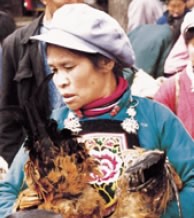The Guopu are one of 120 distinct groups of the Yi nationality in China. There are three ethnic names of Yi groups in northwest Guizhou Province: Guopu, Guozou, and Guoluo. Although these names all sound similar and may refer to a common ethnic origin, today each name represents a distinct group.
According to some sources, "It was the great Emperor Kang-He who gave the [rulers of Weining] the hereditary government of a number of Lolo [Yi] tribes in 1713. The Emperor Yang Cheng, wishing to consolidate the Chinese suzerainty which until that time had been purely nominal, took up arms against the Lolo in 1727, and crushed them. A great number of them abandoned their country, flying towards the west, crossing the Blue [Yangtze] River, and taking refuge in the wild ranges of Chonolevo and Shama, then covered with forests, to which they set fire."
In Weining County, "since the slopes are gentle, strip cultivation rather than terracing is the norm, although the strips do tend to follow the natural contours of the land. In season, the ripening crops produce surprisingly vivid slashes of color, the predominant green tinged with contrasting highlights depending on the crop - pink and red for sweet buckwheat, white for bitter buckwheat, for example. The potato plant is visible everywhere, potatoes forming a dietary staple for the peoples of the Wumeng Mountains. Maize is also grown, but the climate and altitude are unfavorable for rice."
The traditional religion of the Guopu includes worship of the heavens, earth, mountains, rivers, trees, grass, bamboo, rocks, wells and, above all, the spirits of the sun and the moon.
Some Guopu professed Christ as their Lord. The China Inland Mission and the Methodists both had missionaries in Weining County. In 1907 they established the first church in the area. The missionaries soon saw the need to separate their Yi and Miao work. Between 1957 and 1966 the former China Inland Mission churches experienced severe persecution. Because of the government crackdowns against religion, the Yi churches including the Guopu went underground, meeting in secret. In 1988, fifteen Yi churches were reopened.
The Guopu church needs to produce lasting fruit that will bless all of China.
Pray for the Lord to do a new work among Guopu men, drawing them to the King of kings.
Pray for the Lord to guide and protect Guopu families.
Pray for the Lord to use Guopu Christians as salt and light to those around them.
Scripture Prayers for the Guopu in China.
Operation China, Asia Harvest, Copyrighted © Used with permission
| Profile Source: Joshua Project |










